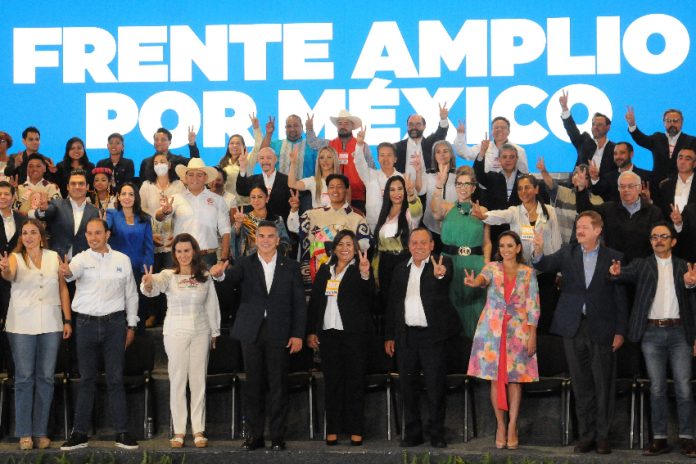The alliance of Mexico’s main opposition parties unveiled on Monday the method it will use to select its 2024 presidential candidate, and said that the winner will be announced Sept. 3.
The National Action Party (PAN), the Institutional Revolutionary Party (PRI) and the Democratic Revolution Party (PRD), which together form the Va por México coalition, will back a single candidate to contest the June 2, 2024 election.
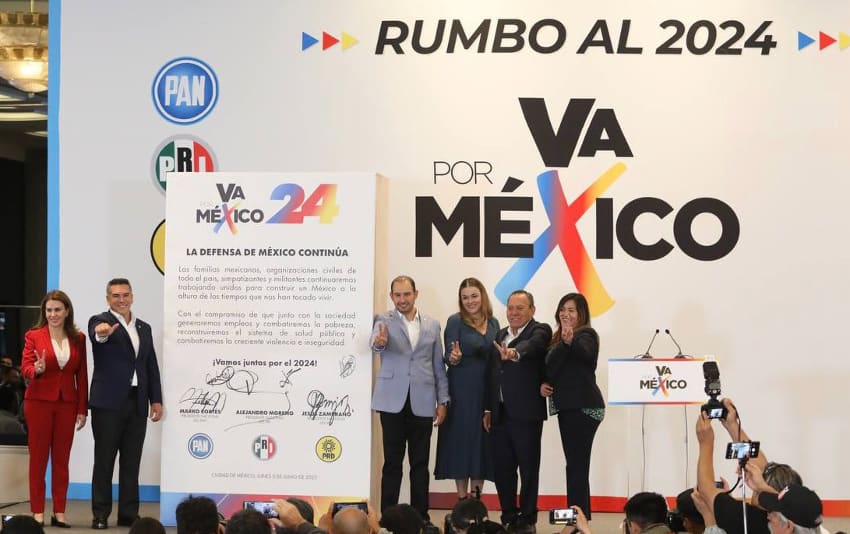
Six aspirants to the candidacy of the ruling Morena party are already campaigning to become “the coordinator of the defense of the transformation” of Mexico that President López Obrador asserts his government is carrying out. Morena is set to announce its new standard bearer on Sept. 6.
At an event in Mexico City on Monday, the three-party opposition alliance presented a video outlining the process it will use to select “the person responsible for the construction of the Frente Amplio por México” (Broad Front for Mexico), which will also include citizens’ groups, such as those that opposed the government’s recently-invalidated electoral reform laws.
The Frente Amplio will apparently supersede the Va por México brand in the lead-up to the 2024 election.
In an attempt to avoid violating established timeframes for “pre-campaigns” for the presidential election and thus evade sanctions, both Morena and Va por México are using alternative terms to describe the person who will become their presidential candidate.
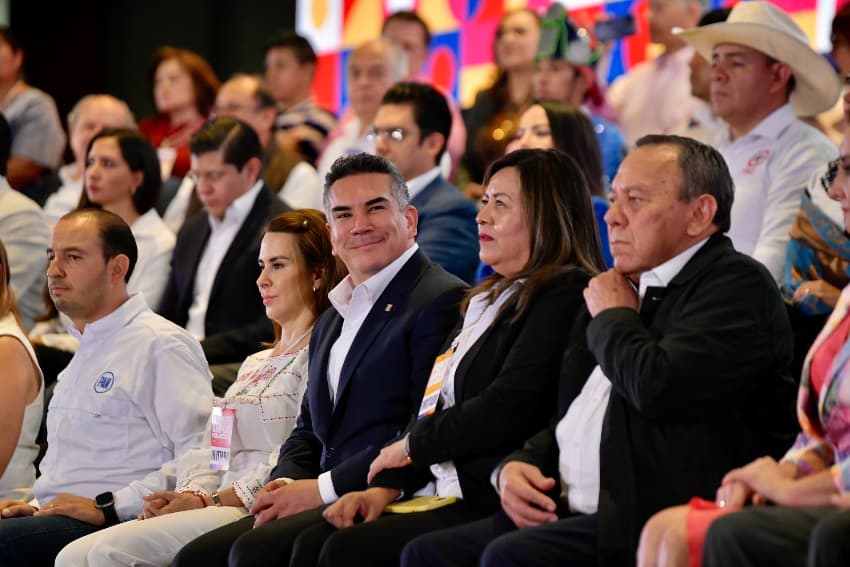
The Va por México video explains that the opposition’s selection process will be carried out in three stages.
In the first stage, which will commence July 4, aspirants to the Va por México candidacy will be required to register their interest with one of the alliance’s three parties.
The registered participants will subsequently be required to collect signatures of support via an “electronic platform” to be set up by Va por México. Those who reach the minimum level of support required – which wasn’t announced Monday but is believed to be 150,000 signatures – will be permitted to advance to the subsequent stage of the selection process.
The presidential hopefuls who reach the second stage will be required to participate in a “great forum” to “discuss and analyze” their vision for Mexico. The aspirants will subsequently be included in “public opinion studies” – polling, in other words – that will determine the three contenders with the greatest support.
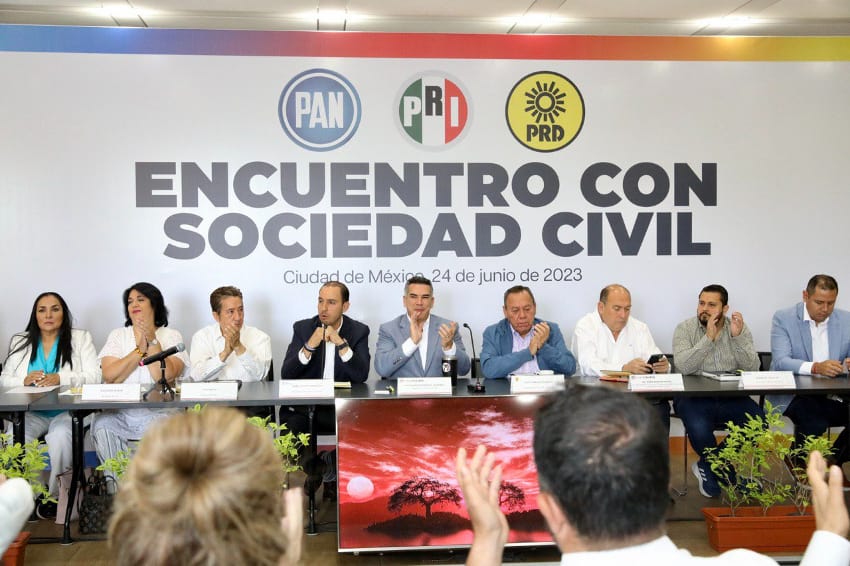
The three “finalists” will progress to the third stage, during which five “regional forums” will be held to give the would-be candidates another opportunity to present their ideas and sell themselves to voters.
New public opinion studies will be carried out to gauge support for the three aspirants and the results will be published on Sept. 3.
A “direct” vote in which registered citizens can participate will be held on the same date, with the results to be announced that night.
The results of the third stage public opinion studies and the vote will be given equal weighting to determine the “person responsible for the construction of the Frente Amplio por México.”
The entire process will be run by an “organizing committee” and overseen by a “citizens’ observatory,” according to the video presentation.
“The presidential candidacy will be decided by all Mexicans,” said PAN national president Marko Cortés, perhaps forgetting to use the alternative moniker for the future Frente Amplio leader.
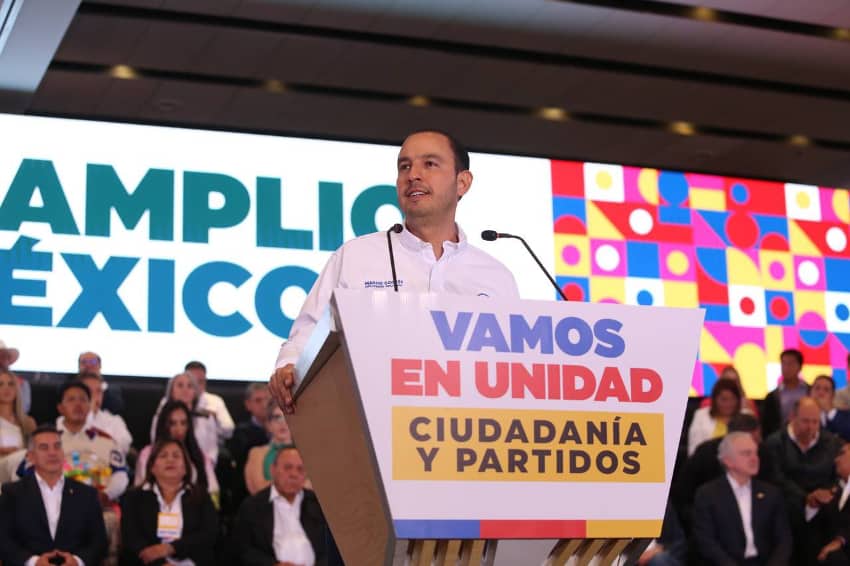
Among the citizens who have expressed interest in representing the PAN, the PRI and the PRD at the 2024 presidential election are:
- Senator Claudia Ruiz Massieu, a former PRI national president and cabinet minister in the 2012–18 government led by Enrique Peña Nieto.
- Senator Beatriz Paredes, a former ambassador to Brazil who has also served as PRI national president.
- Enrique de la Madrid, tourism minister in the Peña Nieto administration and son of former president Miguel de la Madrid.
- José Ángel Gurría, a cabinet minister in the 1994-2000 government led by Ernesto Zedillo and secretary-general of the Organization for Economic Co-operation and Development between 2006 and 2021.
- Deputy Ildefenso Guajardo, economy minister in the Peña Nieto government.
- Deputy Santiago Creel, interior minister in the 2000-2006 government led by Vicente Fox.
- Senator Lilly Téllez, who defected from the ruling Morena party to join the PAN’s congressional team in 2020.
- Senator Xóchitl Gálvez, a former mayor of the Mexico City borough of Miguel Hidalgo.
- Silvano Aureoles, Former governor of Michoacán
- Gustavo Hoyos, former head of the Mexican Employers Federation.
- Senator Miguel Ángel Mancera, a former mayor of Mexico City.
All those aspirants – bar Mancera – attended the Va por México event, held in a hotel in the capital. Yucatán Governor Mauricio Vila announced Sunday that he had decided not to seek the opposition alliance’s candidacy for the 2024 presidential election.
Former president Vicente Fox and businessman Claudio X. González, a leading figure in the opposition movement, were among the distinguished guests at the event.

President López Obrador sought to discredit the opposition’s candidate selection process even before it was officially announced.
The “corrupt, looting oligarchy” led by González is “coming to an agreement” to decide the opposition candidate, he said at his Monday morning press conference after dismissing the selection process as a “sham.”
“… The top magnates are consulted, the conservative political leaders are also consulted. What do [former presidents] Fox, Calderón and Salinas think? They do that consultation then they interact with organic intellectuals, writers, journalists and after that [the candidate] is known,” López Obrador said.
“[The selection process] is a sham, and the conservative bloc candidate, regardless of who it is, … [will] continue with the same classist, racist, discriminatory politics,” he asserted.
Jesús Zambrano, national president of the PRD, assured aspirants that there will be no “simulation” in the selection process, but rather “democratic decisions” taken by citizens.
Most polls suggest that Morena – which was founded by López Obrador – will win a second consecutive term in government at the 2024 elections, at which the federal Congress will also be renewed.
The leading contenders for Morena’s nomination are Claudia Sheinbaum, Marcelo Ebrard and Adán Augusto López Hernández, who left their respective positions as Mexico City mayor, foreign affairs minister and interior minister earlier this month to focus on winning the ruling party’s candidacy and defending and building on López Obrador’s political and social legacy.
With reports from El País, Reforma, El Financiero and El Universal
